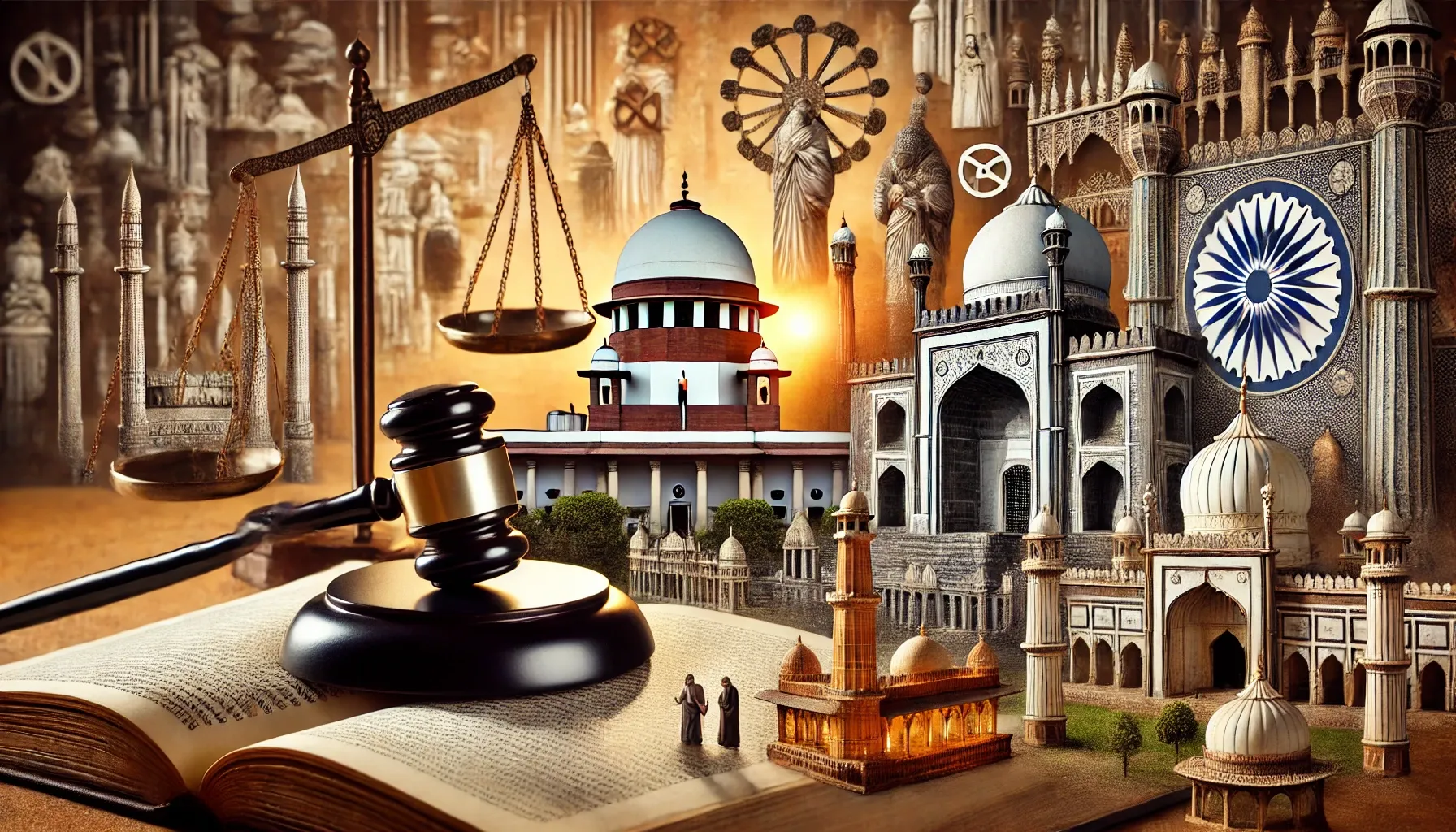The Supreme Court halts the registration of new suits against places of worship and bars survey orders in pending cases, while hearing petitions challenging the Places of Worship Act, 1991.

On December 12, 2024, the Supreme Court of India intervened in a crucial matter related to the Places of Worship (Special Provisions) Act, 1991, issuing significant orders to curb the increasing number of suits against places of worship. The Court ordered that no new suits can be registered against places of worship until further orders and that effective interim or final orders, including survey orders, should not be passed in pending cases. This decision came amidst growing concerns about the rising number of lawsuits challenging the ownership of mosques and shrines across India.
Court’s Orders on Pending and New Suits
- Suspension of New Suits:
- The Court directed that no further suits can be registered against places of worship in India until further notice. This decision was made while hearing petitions challenging the constitutionality of the Places of Worship Act.
- The Court noted that suits could still be filed, but no action should be taken on them until further directions from the Supreme Court.
- Orders in Pending Cases:
- In cases that are already pending, such as those concerning the Gyanvapi Mosque, Mathura Shahi Idgah, and Sambhal Jama Masjid, the Court ordered that no effective interim or final orders, including survey orders, should be passed.
- The Court intervened after concerns arose over the potential escalation of tensions due to surveys and disputes over religious sites, particularly after violence erupted in Sambhal in November 2024 following a survey order related to a 16th-century mosque.
Concerns Over Increasing Litigation
- Impact of Multiple Suits:
- The Supreme Court’s intervention follows the growing number of suits challenging the religious character of places of worship, including mosques and dargahs. At present, there are 18 suits pending across the country involving 10 mosques and shrines.
- The Court’s decision came in response to violent events triggered by surveys of places of worship, such as the Sambhal Jama Masjid case, which led to the deaths of four people in November 2024.
- Legal and Constitutional Concerns:
- During the hearing, Justice KV Viswanathan expressed concerns about the constitutionality of the Places of Worship Act and the potential conflict with the Supreme Court’s authority.
- He remarked, “Civil courts can't run a race with the Supreme Court... There is a larger question that must be addressed.” This comment underlined the importance of judicial oversight in cases involving sensitive religious issues.
The Role of the Union Government
- Union Government’s Counter-Affidavit:
- The Court directed the Union Government to file a counter-affidavit within four weeks regarding the petitions challenging the Places of Worship Act.
- Despite several extensions, the Union Government has yet to submit its response, leading the Court to express concerns over the delay in addressing the matter.
- Political and Legal Interventions:
- Several political parties, including the CPI(M), Indian Union Muslim League, DMK, and RJD MP Manoj Kumar Jha, have filed intervention applications supporting the protection of the Places of Worship Act, highlighting the importance of maintaining religious harmony.
- The Jamiat Ulema-i-Hind has also filed a petition seeking the implementation of the Act to protect the status quo of religious places as they were on August 15, 1947.
Implications of the Court’s Order
- Impact on Religious Harmony:
- The Supreme Court’s intervention is a significant step to maintain communal harmony by preventing the escalation of legal disputes over religious sites. The decision highlights the need to respect the status quo of religious structures as per the Places of Worship Act, which aims to preserve the religious identityof places of worship as they were on August 15, 1947.
- Ongoing Legal Proceedings:
- The case is still sub-judice, with further hearings scheduled. The Court has appointed Advocates Kanu Agarwal, Vishnu Shankar Jain, and Ejaz Maqbool as nodal counsel for the Union Government, petitioners, and parties supporting the Act.
Case Title: Ashwini Kumar Upadhyay v. UoI And Ors. WP(C) No. 1246/2020 and connected matters





